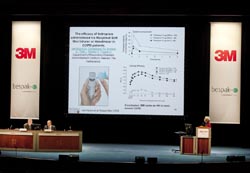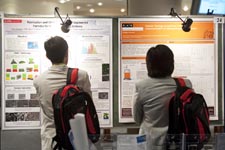At DDL 23, the Drugs in the Lungs Consortium, a focus group of the Academy of Pharmaceutical Sciences, will present a pre-session titled “Addressing the Challenges in Inhaled Drug Discovery and Development” on the morning of December 5. According to Forbes, who organized the group, “the session will provide an update on the collaborative efforts of academia, industry and regulatory agencies to expedite the development of inhaled products. This will report activities in the areas of dosimetry, safety assessment, the role of imaging and the impact of lung transporters.”
 The meeting itself will open Wednesday afternoon, following registration and a networking opportunity, with the 2nd annual DDL Lecture by Malcolm Johnson, Respiratory Science Consultant at GlaxoSmithKline. The former Global Director of Respiratory Science at GSK, Dr. Johnson is a member of the American Thoracic Society and the European Respiratory Society and has published more than 200 research articles. His DDL lecture is titled “Bronchodilators: Past, Present, and Future.”
The meeting itself will open Wednesday afternoon, following registration and a networking opportunity, with the 2nd annual DDL Lecture by Malcolm Johnson, Respiratory Science Consultant at GlaxoSmithKline. The former Global Director of Respiratory Science at GSK, Dr. Johnson is a member of the American Thoracic Society and the European Respiratory Society and has published more than 200 research articles. His DDL lecture is titled “Bronchodilators: Past, Present, and Future.”
Due to an expansion of the venue, the Edinburgh International Conference Centre, Hammond says, DDL should have more room for both exhibits and posters this year. Several new companies have already been added to the exhibitor list, and the organizers predict that the total number of sponsors exhibiting may slightly exceed last year’s total.
With approximately 100 abstracts submitted, the DDL 23 committee recruited a panel of additional reviewers, including Darragh Murnane, Vice President of the Aerosol Society, which presents the DDL meeting. Murnane notes that, ’’The external review process this year added to the number of internationally acclaimed inhalation experts available to conduct high-level scientific review of submissions for inclusion in this year’s program,” easing the burden on the DDL committee members who have previously reviewed all abstract themselves.
 A percentage of the abstracts have been selected for podium presentations based on both quality and a fit with the conference topics. Most of the remaining abstracts will be presented as posters. “If the science is right,” Hammond and Forbes say, “the chances of being accepted are quite good. We insist on high quality science; but within those restrictions, we try to be quite inclusive, and we try to work with authors to ensure that the material is suitable.”
A percentage of the abstracts have been selected for podium presentations based on both quality and a fit with the conference topics. Most of the remaining abstracts will be presented as posters. “If the science is right,” Hammond and Forbes say, “the chances of being accepted are quite good. We insist on high quality science; but within those restrictions, we try to be quite inclusive, and we try to work with authors to ensure that the material is suitable.”
Winners of the poster prizes and of the Pat Burnell New Investigator Award will be presented at a cocktail reception sponsored by Aptar Pharma and Presspart on the evening of December 6.


